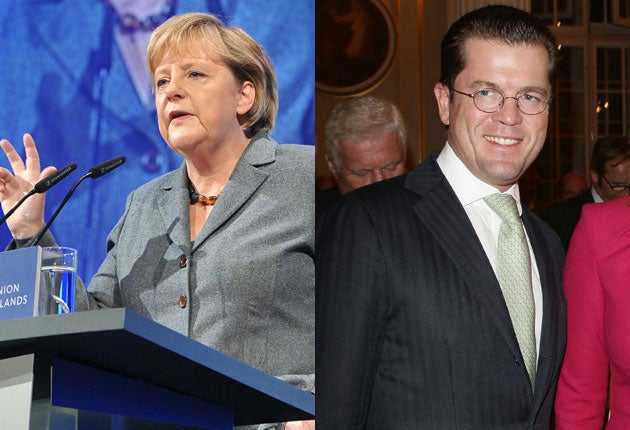Weak Merkel stokes xenophobia as she fights for political survival

Your support helps us to tell the story
From reproductive rights to climate change to Big Tech, The Independent is on the ground when the story is developing. Whether it's investigating the financials of Elon Musk's pro-Trump PAC or producing our latest documentary, 'The A Word', which shines a light on the American women fighting for reproductive rights, we know how important it is to parse out the facts from the messaging.
At such a critical moment in US history, we need reporters on the ground. Your donation allows us to keep sending journalists to speak to both sides of the story.
The Independent is trusted by Americans across the entire political spectrum. And unlike many other quality news outlets, we choose not to lock Americans out of our reporting and analysis with paywalls. We believe quality journalism should be available to everyone, paid for by those who can afford it.
Your support makes all the difference.Chancellor Angela Merkel has branded Germany's attempts to build a multicultural society an "utter failure" in an unprecedented speech designed to revive her own and her conservative party's flagging popularity and regain the initiative in an increasingly hostile public debate about immigration.
Ms Merkel, who normally scrupulously avoids courting xenophobic opinion, bluntly told a meeting of young members of her ruling Christian Democratic party that the "Multikulti" notion of people from different cultural backgrounds living happily side by side simply did not work.
"This approach has failed, utterly failed," she told applauding young conservatives gathered at a conference in Potsdam outside Berlin on Saturday. Instead she urged Germany's 16 million immigrants to do more to integrate into society and to learn German.
Earlier, in a reference to Germany's 2.5 million Turkish immigrant population, she told delegates: "In the beginning of the Sixties, we called on foreign workers to come to Germany and now they live in our country." She added: "We kidded ourselves for a while by saying they won't stay, sometime they will be gone, but this isn't reality." Ms Merkel's remarks were both a response to a surge of anti-immigrant feeling in Germany and an attempt to counter her vulnerable position in her own party.
Disastrous opinion polls and right-wing dissatisfaction with her perceived "left-wing" conservatism have led to an open discussion about an early replacement for Germany's first woman leader. The right-wing conservatives' favoured candidate is Karl-Theodor zu Guttenberg, the 38-year-old conservative defence minister. Yesterday Mr zu Guttenberg and his glamorous wife Stephanie were pictured on the front cover of Der Spiegel magazine as "The fabulous zu Guttenbergs".
Ms Merkel's broadside against multiculturalism followed a recent and disturbing survey about Germans' attitudes to foreigners, calls for a ban on Muslim immigration, and a best-selling book by a former Central Bank member which claims that Muslims are linked to crime and welfare payments.
Last week an opinion poll conducted by the left-leaning Friedrich Ebert foundation concluded that more than 30 per cent of Germans thought that their country was "overrun by foreigners"; 55 per cent thought Arabs were "unpleasant". The poll was published a day after Horst Seehofer, the Bavarian conservative leader, whose party is a sister organisation to Ms Merkel's Christian Democrats, insisted that multiculturalism was "dead" and called for a ban on future immigration by Turks and Arabs.
The increasingly heated debate about immigration and integration was set in motion in August with the publication of the unashamedly xenophobic, yet hugely popular, book Deutschland schafft sich ab – which means "Germany is doing away with itself" – by a former German central bank member and Berlin city councillor called Thilo Sarrazin.
Despite being virulently anti-Muslim and having been condemned as akin to Nazi propaganda by Germany's Jewish organisations, the book is Germany's No1 non-fiction bestseller. The author's public readings are packed by what one newspaper described as "well-heeled, greying members of the bourgeoisie". At a reading in Munich, a journalist and a university professor were shouted down despite being invited to present findings which contradicted the book.
For Ms Merkel, the runaway immigration debate is the latest in a string of unwelcome developments which have seen the popularity of her ruling conservative-liberal coalition sink to record lows over the past three months.
Ms Merkel's left-wing brand of conservatism has been attacked by the right wing of her party with some members declaring that they fear the possibility of a breakaway hard-line conservative party forming in Germany. Her failure to take the initiative on immigration has exacerbated the situation, they say.
In an article in the respected conservative Frankfurter Allgemeine newspaper last week, several unnamed Christian Democrat politicians were quoted as saying they considered Mr zu Guttenberg, who is rated Germany's most popular politician, as Ms Merkel's most obvious replacement. "If Merkel loses Baden-Württemberg [a conservative stronghold], then she will be out of the picture," a senior party member said.
The leader-in-waiting
* Born in Munich in 1971, Karl-Theodor zu Guttenberg is the youngest defence minister in Germany's history. He is widely seen as the country's most popular politician.
A hereditary baron, Mr zu Guttenberg is a member of the Bavarian Christian Social Union (CSU) – a sister party to Angela Merkel's Christian Democrat party (CDU). He began his career with military service in the Light Mountain Infantry before studying law and politics at the University of Bayreuth. He entered the Bundestag in 2002.
Having worked as CEO of Guttenberg GmbH, which looks after his family's considerable investments, he was controversially appointed economy minister before taking the defence post. He is credited with significantly raising the profile of Germany's mission in Afghanistan and winning the support of its troops.
Considered to be a charismatic and modern politician who appeals to Germany's young people, he has almost 40,000 people endorsing his Facebook fan page and photos showing him in merchandise from the rock group AC/DC.
Join our commenting forum
Join thought-provoking conversations, follow other Independent readers and see their replies
Comments